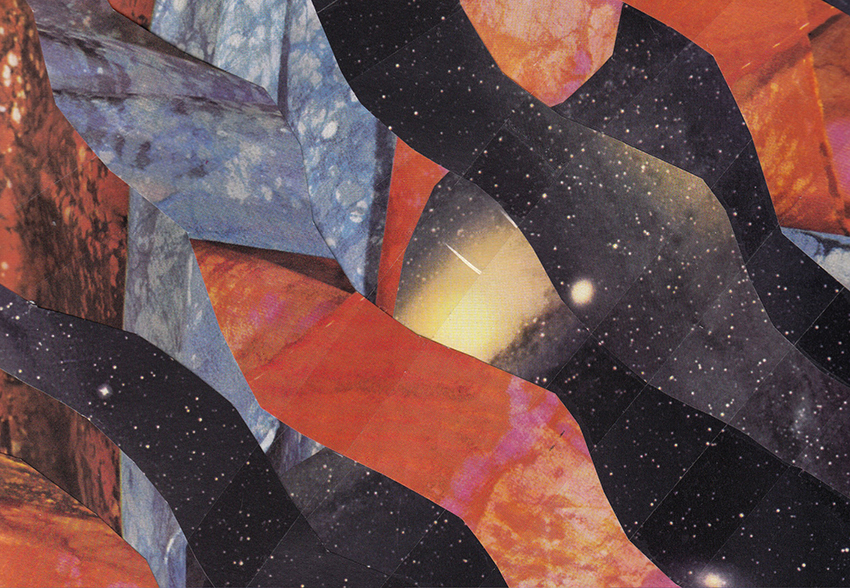Chantal T.Paris Érik Bordeleau Marie-Douce St-Jacques Simon Brown Alexandre St-Onge Patrick Poulin Speculative Gestures // Writing with Art

L. Branchu, 2015
As writers and artists producing texts in an art context, we face the challenge posed by the arrangement of a given artwork’s concrete and abstract elements.
This writing is never simple and never takes place in isolation. It is part of a highly relational process, as envisioned by philosopher Alfred North Whitehead who attributes the same creaturely value to the myriad things that make up our multiverse and operate at different levels, mutually and continually affecting each other.
This point of view disrupts and goes beyond anthropocentric, logocentric, and territorial perspectives. It asks us to perceive and situate ourselves differently, taking us into speculative thought, which can, perhaps, help us overcome some of the limitations and determinisms our humanity encounters.
Thinking in these terms means considering the artwork as a dynamic assemblage of multiple foci of existences, traversed by tangible and intangible forces and movements, tracing a line of sense and sensations with unpredictable, yet compositional, vanishing points. Writing in these terms means inhabiting the artwork’s universe through the vector of the text, while remaining sensitive to the surrounding micro, meso, and macro textures.
We wish to explore these ideas with you in a writing workshop organized in six sessions:
\ “Who does Earth think she is?” Aspects of geophilosophy
// Ectoplasms, pareidolia, and other meaning agitators: the speculative practice of collage
\ Translating the invisible // Speculative listening as a poetic process of experimentation
// The world without objects
\ Alloys: interstitial manifestations
// “A truthless imagination can lead to true connections”
We will try to provoke a field of multidimensional considerations by using tactics meant to remove obstacles, circumvent and avoid the pitfalls that often undermine scriptors. These essays will help you experiment and write on your selected artwork, which can be finished or in process, in a form of your own choosing, whether that be linear or not, narrative or otherwise.
During this speculative exploration, we will also explore publishing possibilities so that we can address our textual creatures and make our small contributions to the ecology of writing practices and, more broadly, to the ecology of ideas taking shape.
*The workshop is intended for emerging or established writers and artists who wish to explore writing with art. The workshop is given in French, but the texts can be written in French or English.
Prerequisites
– Be a professional artist, creator or cultural worker;
– Participants are expected to have some writing experience and to write their texts autonomously with the aim of publishing them;
– Participants must come with their chosen artwork in mind for the first session;
– Be a self-employed worker or a salaried employee in an enterprise not subject to 1 % Training Investment*;
– Attend every workshop session.
*Any enterprise whose total payroll is $1.000.000 or more is subject to 1% Training Investment. (Emploi-Québec Program)
Number of participants: maximum 8
Registration period: December 10-18, 2015 and January 5-12, 2016
Call or email the New Media Lab: 514 844 3250, ext. 230 or lab@oboro.net.
Cost: $80 (taxes included)
Schedule: On Saturday, January 16, 23, 30, and February 6, 13, 20, 2016, 1:30-4:30 pm
(with a possible last session on Saturday, February 27)
POLICY
Reservation / Payment
Reservations can be made by phone or email. Full payment must be made for reservations to be valid. You can pay by credit card (Visa or MasterCard), cheque or in cash. Registration to a workshop is not transferable.
Cancellation / Refund
OBORO does not refund registration fees except in case of illness (with a medical note) or of absolute necessity. In such cases, registration fees are transferable to another workshop or service offered by the New Media Lab.
Workshop Cancellation
OBORO reserves the right to cancel workshops at any time and without advance notice. In this case, registration fees are completely refunded.

L. Branchu, 2015
Chantal T.Paris is a writer and independent researcher in contemporary art. She has a Master in Art History from the Université du Québec à Montréal. Her writing and projects explore relations between writing and art from a post-critical perspective.
Érik Bordeleau is a creative researcher for SenseLab (Montreal, Concordia University). He is the author of Foucault anonymat (Le Quartanier, 2012, winner of the 2013 Spirale Eva-Legrand Award) and of Comment sauver le commun du communisme? (Le Quartanier, 2014). He has written many essays on cinema, philosophy, and art and is interested in the speculative turn in contemporary continental philosophy.
Marie-Douce St-Jacques is a Montreal-based interdisciplinary artist whose activities encompass music, visual arts, publishing and screenwriting. As a musician and composer, she was vocalist and keyboard player in Pas chic chic (2005–2010) and, since 2011, has been one half of duo Le fruit vert with sound artist Andrea-Jane Cornell.
Simon Brown is interested in language, the liberating possibilities of failure, and the sometimes imperceptible, but always changing, relationships between humans and other entities. Using an economy of means and an obscure humour, his texts and interventions have publicly and privately appeared as books, interventions, talks, and operettas.
Alexandre St-Onge is an audio artist, a musician/improviser, and a sonic performer. He has a PhD in Art Theory and Practice (UQAM, 2015) and is fascinated by creativity as a pragmatic approach to the ungraspable. He has published various texts and released ten solo albums, including LE SUJET MODIFIANT LE SUJET (squintfuckerpress), viorupeeeeihean (Oral), Ailleurs (&records), and Entités (Oral).
Patrick Poulin was born in 1976, in Saules, a suburb of Quebec City. After studying philosophy and translation, he completed a PhD in Comparative Literature and currently teaches literature at Collège Montmorency. He published Morts de Low Bat with Le Quartanier and is now writing a novel called Michael.